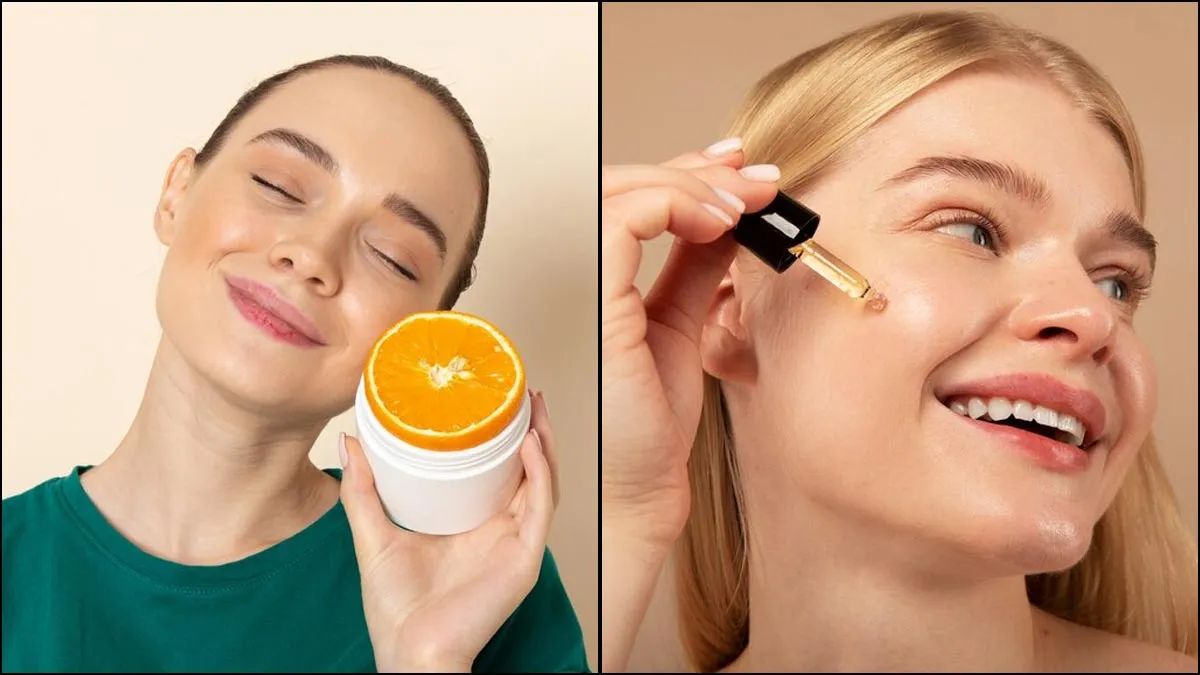
Choosing the right ingredients for your skincare routine can be confusing, especially when faced with options like retinol and Vitamin C. Both are highly effective and widely praised, but how can you determine which one suits your skin best? We will traverse the benefits of both options and then pit them against each other to determine an output.
Table of Content:-
To help you decide, we at OnlyMyHealth have gathered insights from Dr S.C. Bharija, Senior Consultant, Dermatology, Sir Ganga Ram Hospital, New Delhi and Dr Arushi Suri, Consultant Dermatologist, Aesthetic Medicine, Mahatma Gandhi Hospital.
RELATED: Skincare Fads: Is Retinol And Hyaluronic Acid Really The Holy Grail? Expert Unmasks
In Focus: Retinol
-1734936147378.jpg)
Retinol, a Vitamin A derivative, is a staple in many skincare routines, thanks to its powerful anti-ageing and skin-renewing properties. Here are five benefits of using retinol as per Dr Suri.
- Retinol increases the production of new skin cells (proliferation), helping to rejuvenate your skin and improve its overall texture.
- For those struggling with acne, retinol can be a lifesaver. By clearing clogged pores, it reduces breakouts and promotes clearer skin.
- One of retinol’s standout benefits is its ability to stimulate collagen production, which reduces the appearance of fine lines and wrinkles, giving the skin a plump, youthful look.
- Retinol acts as a mild exfoliant by shedding dead skin cells, leaving your complexion smoother and brighter.
- Retinol increases skin cell production (proliferation). It helps unclog pores. Retinol also exfoliates your skin and increases collagen production, which can reduce the appearance of fine lines and wrinkles, giving your skin a fresher, plump appearance.
Expert Insights On Retinol
Dr Bharija says, “It is typically recommended to start with a retinol concentration of 0.1%. If the skin tolerates it well, the concentration can gradually be increased to 0.3% or even 0.5%, depending on the individual’s skin sensitivity. However, higher concentrations, particularly during winter months, can sometimes cause mild irritation and redness.”
Our expert highlights that to manage these effects, using a moisturiser alongside retinol is essential. This helps reduce inflammation and dryness caused by retinol use.
Benefits of Vitamin C

Vitamin C, also known as ascorbic acid, is a versatile antioxidant that brightens and protects the skin while addressing pigmentation issues. Here's a lowdown of its benefits as shared by Dr Suri.
- Vitamin C inhibits melanin production by reducing the activity of the tyrosinase enzyme. This makes it highly effective in lightening dark spots and evening out skin tone.
- It protects the skin from free radicals caused by UV rays and pollution. This helps slow the ageing process and prevents damage to skin cells.
- Known for its brightening effect, Vitamin C leaves the skin looking radiant and refreshed.
- By neutralising environmental damage, Vitamin C reduces fine lines and wrinkles, keeping the skin youthful for longer.
RELATED: Understanding Acne Purging: Causes and Effective Treatment Strategies
Retinol vs. Vitamin C: Which One Is Better?
Both retinol and Vitamin C have unique benefits, but their effectiveness depends on your specific skin concerns. Retinol is best for those looking to tackle fine lines, wrinkles, and acne-- especially for those who have enlarged pores. It works deeply within the skin to promote cell turnover and collagen production.
Dr Bharija says, “Vitamin C, on the other hand, acts as a potent antioxidant, reducing wrinkles, pigmentation, and protecting the skin from environmental damage. Both retinol and Vitamin C are highly beneficial for the skin, addressing concerns such as wrinkles, pigmentation, and photoaging.”
Can They Be Used Together?
“Interestingly, these two ingredients can be used together, as they have different modes of action but complement each other effectively. However, their combined use depends on the individual’s skin tolerability”, says Dr Bharija. Adding to that, Dr Suri advises our readers to do so only under the guidance of a dermatologist.
Our expert also highlights that it’s crucial to apply sunscreen with an SPF of around 50 when using retinol or vitamin C serums, as these ingredients can increase sun sensitivity. Sunscreen not only protects the skin but also enhances the overall benefits of the routine.
What Should You Take Away From This?
During winter, moisturising becomes even more important to deal with dryness and prevent irritation, which can exacerbate wrinkles. A good moisturiser should always be an integral part of your skincare routine, especially when using active ingredients like retinol and Vitamin C.
When it comes to retinol and Vitamin C, it’s not about choosing one over the other, it’s about understanding your skin’s needs.
- Go for RETINOL if your main concerns are ageing signs, acne, or dullness.
- Opt for VITAMIN C if you’re looking to brighten your skin, reduce pigmentation, or protect against environmental damage.
If your skin can tolerate both, incorporating them into your routine can provide comprehensive benefits. Just ensure to use them at different times of the day and always apply sunscreen to protect your skin.
By understanding how these ingredients work and tailoring them to your needs, you can create a skincare regimen that keeps your skin healthy, radiant, and youthful.
Also watch this video
How we keep this article up to date:
We work with experts and keep a close eye on the latest in health and wellness. Whenever there is a new research or helpful information, we update our articles with accurate and useful advice.
Current Version